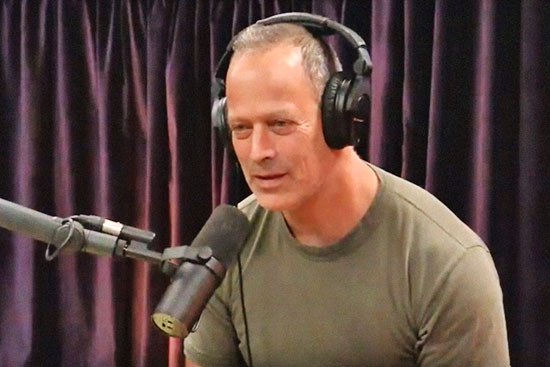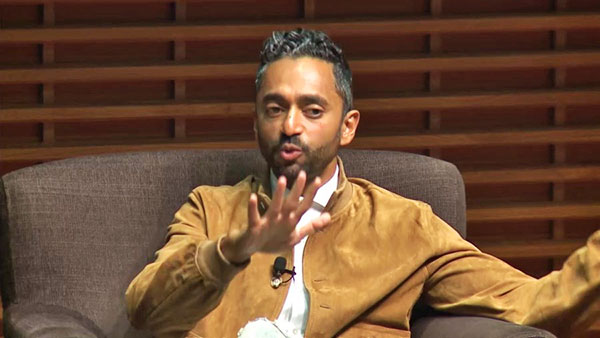"When Facebook
was getting going, I had these people who would come up to me
and they would say,
'I'm not on
social media.'
And I would
say,
'OK. You
know, you will be.'
And then they
would say,
'No, no,
no. I value my real-life interactions. I value the moment. I
value presence. I value intimacy.' And
I would say, … 'We'll get you eventually.'"
"I don't know
if I really understood the consequences of what I was saying,
because [of] the unintended
consequences of a network when it grows to a billion or 2
billion people and… it literally changes your relationship with
society, with each other…
It probably
interferes with productivity in weird ways. God
only knows what it's doing to our children's brains."
"The thought
process that went into building these applications, Facebook
being the first of them… was all about:
'How do we consume as much of
your time and conscious attention as possible?'"
"And that means
that we need to sort of give you a little dopamine hit every
once in a while, because someone liked or commented on
a photo or a post or whatever.
And that's
going to get you to contribute more content, and that's going to
get you… more likes and comments."
"It's
a social-validation feedback loop… exactly the kind of
thing that a hacker like myself would come up with, because
you're exploiting a
vulnerability in human psychology."
"The inventors,
creators - it's me, it's Mark [Zuckerberg], it's Kevin Systrom
on Instagram, it's all of these
people - understood this consciously. And we did it anyway."
Sean Parker
Final Thoughts
The human race is
stepping in to the perfect storm for disaster in our relationship
with technology as advances in robotics, artificial intelligence and
big data are converging to present us with unbelievable challenges.
Palihapitiya and Parker
of Facebook are speaking to the legitimate concerns about these
tools on the human psyche and how they affect our psychology.
Combine this with,
-
robot sex toys
-
killer-robots
-
mind-boggling AI,
...and
we really have to wonder what is coming:
Acclaimed Journalist and Author
explains...
What
Social Media is Doing to Society
by Vic
Bishop
November 09,
2017
from
WakingTimes Website

Just a generation
ago human communication was completely different from now, and as
technology moves faster than we can keep pace, many of us are
realizing that there are discreetly negative aspects to such
immersion in social media.
Sebastian Junger
is an American journalist and author, best-known for his coverage of
the
war on terror in which he spent a great deal of time in the
front lines of Afghanistan.
His book
War, was a scorching portrayal of
life on the edge of the American empire and the conflux of
brotherhood and futility. In 2010 he directed the acclaimed
documentary, Restrepo, which captured life for the American
grunt in Afghanistan.
As an
anthropologist, Junger has a keen perspective on humanity and the
forces which drive us, hold us together and tear us apart.
Speaking in a
recent podcast with Joe Rogan, Junger commented on the
effects that social media and handheld technologies are having on
society.
His views are quite
important as we swiftly approach the singularity, all the while
never really getting around to asking the important questions about
how technology may not be serving us well.
"I'm an
anthropologist… and I look at the behavior, literally the
physical behavior of people with smartphones and it looks
anti-social, unhappy and anxious, and I don't want to look like
that, and I don't want to feel like I think those people feel."
Sebastian Junger
Their talk began
with a conversation about why Junger does not carry
a smartphone, but rather an older
style flip phone, then quickly jumped into the effects of social
media on mental health and on society as a whole.
Citing increases
in,
-
mass
shootings
-
depression
-
anxiety
-
suicide,
...and
these types of negative events, Junger links this to the rise of the
information age, in which people are actually less connected to
human beings than ever before.
Rogan remarks that
smartphones seem like a drug that doesn't kill you but sucks up all
your time, causing you to just stare blankly at your hand.
"There is a
drug. It's that, social media.
I think the big
lie of our generation is the phrase social media. It really
isn't, it's anti-social media.
And it has a
lot of uses, and whatever, but it's not social in any human
sense, and if you look at suicide rates, depression rates, PTSD
rates, anxiety rates, they're doing nothing but going up in our
society. Mass shootings…
All those
things, they're indicators of something and they're all going up
in our society despite the fact that we're a very wealthy,
powerful, relatively peaceful society.
I can't prove
that it's social media, the internet, obviously, but the fact
that those things are happening at the same time does make me
wonder that these new devices certainly don't bring happiness."
Sebastian Junger
A big part of the
issue, according to Junger, is that people are not actually no
longer experiencing their lives in the way that we were meant to.
"I think the
problem is when people want to be socially connected constantly,
no matter what they're doing. And that, I think, keeps people
from actually fully experiencing whatever they're actually
doing."
Sebastian Junger
There is a great
appeal to these technologies, to be sure, but something is amiss
here, and we are overlooking something as the technologies advance
and push themselves further into our lives.
"The thing
about social media is that it sort of weaponizes blandness.
It allows, it
gives people a platform for the most mundane, uninteresting
aspects of their lives, because they have to constantly,
constantly be producing some kind of output, communication."
Sebastian Junger
Remarking on why
teenagers are increasing in rates of anxiety, and he notes the need
for constant validation that social media creates.
"Anxiety rates
in teenagers have skyrocketed.
Anxiety partly
comes from a sort of a painful self-awareness, and of course,
that's amplified by because you can never escape the opinions of
your peers.
That's
crippling to people."
Sebastian Junger
Watch the first few
minutes of this episode for Junger's complete comments on this
subject:
Of course, there is
good reason to question the effects that social media is having on
our minds.
Even one of the
founders of Facebook, Sean Parker, recently stated that these
platforms exploit a vulnerability in the human psyche to create a
feedback loop of self-validation.
His comments were
quite candid, and show how just how dangerous this is.
"When Facebook
was getting going, I had these people who would come up to me
and they would say,
'I'm not on
social media.' And I would say, 'OK. You know, you will be.'
And then they would say, 'No, no, no. I value my real-life
interactions. I value the moment. I value presence. I value
intimacy.' And
I would say, … 'We'll get you eventually.'"
"I don't know
if I really understood the consequences of what I was saying,
because [of] the unintended
consequences of a network when it grows to a billion or 2
billion people and… it literally changes your relationship with
society, with each other… It probably interferes with
productivity in weird ways. God
only knows what it's doing to our children's brains."
"The thought
process that went into building these applications, Facebook
being the first of them… was all about:
'How do we consume as much of
your time and conscious attention as possible?'"
"And that means
that we need to sort of give you a little dopamine hit every
once in a while, because someone liked or commented on
a photo or a post or whatever. And that's going to get you to
contribute more content, and that's going to get you… more likes
and comments."
"It's
a social-validation feedback loop… exactly the kind of
thing that a hacker like myself would come up with, because
you're exploiting a
vulnerability in human psychology."
"The inventors,
creators - it's me, it's Mark [Zuckerberg], it's Kevin Systrom
on Instagram, it's all of these
people - understood this consciously. And we did it anyway."
Sean Parker



